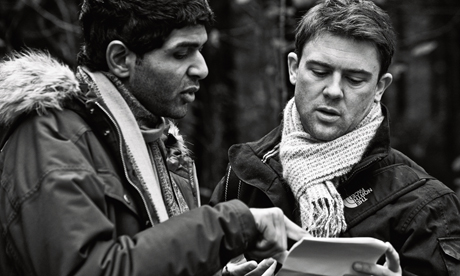Resistance – and the irresistible Owen Sheers

Owen Sheers (R) with Amit Gupta (L) the director of Resistance
Something is not right in the Olchon Valley. One morning in 1944, the inhabitants of a small village nestled in the ominous shadows of the Black Mountains wake up to find that all the menfolk have disappeared.
The assumption is that they have vanished into the hills to join ‘the resistance’, for this is 1944, the D-Day landings have failed and Wales has been occupied by Nazis. So begins Resistance – a recently released feature length film featuring Michael Sheen and adapted from the novel of the same name by Hackney-based writer Owen Sheers.
Resistance begins immediately after the women make their shocking discovery. They don’t have much time to digest the disappearance before a company of German troops arrives in the village. Snowy conditions force them to make camp, and what follows is an unsettling but moving study of the complex dynamics between the occupiers and the occupied.
The plot revolves largely around Sarah, mesmerisingly played by Andrea Riseborough, whose strong faith and devotion to her absent husband is challenged by head Nazi Albrecht (Tom Wlachiha) who is conflicted by the orders he is given and slowly becomes infatuated with Sarah. As Sheers points out, the resistance in question refers to the German soldiers as much as the villagers.
By no means is it an easy film to watch; like the book, it is a slow burner. One of the viewer’s first observations is the lack of much incidental music. It’s not an exaggeration to suggest that the howling wind could receive top billing on the sound credits. This adds to the overbearing feeling of isolation and abandonment that the landscape evokes. It is the scenery of Sheers’ native land that is the star of the show and his inspiration.
“It was a story that grew out of the landscape more than anything else,” he explains over coffee at L’Eau à la Bouche café on Broadway Market. “The area has been used by many different characters over the years, from the 12th century monks that built an abbey there, romantic poets wanting to create their own Garden of Eden and artists forming communes. I’m fascinated about how certain geography allows people to live life on their own terms.”
Although he identifies with poetry first, Sheers has kept up a colourful and diverse body of work, aided by long sessions at the London Fields Lido. Past projects include The Dust Diaries, a reportage tracing his distant uncle’s missionary life in Rhodesia, and a documentary on unsung war poet Keith Douglas.
He is currently working with sick and wounded veterans to write and perform their own play in the West End. Most notably, Sheers also produced a 72-hour immersive theatre contemporary retelling of The Passion in Port Talbot.
“We have the last supper at the Sandfields Social and Labour Club, with the Manic Street Preachers playing live, then the police break it up, there is an angry mob, a trial and Jesus (Michael Sheen) is crucified on a roundabout. There were 12,000 people at the crucifixion and at one point the real police arrived and nobody could tell who were the actors. I thought to myself, ‘now this is a piece of theatre!’”
World War Two dramas all too often adopt the jingoism and triumphalism of the conqueror; they also tend to be set in mainland Europe. Watching depictions of fierce battles raging on distant battlefields is an experience entirely different from seeing German troops striding across familiar landscapes, acting like they own the place.
Resistance is bleak and dystopian and audiences may well be shocked when they are presented with a vivid, jarring tableau of an occupied Wales – one scene of a country show complete with marquees, sheep and swastikas, manages to be both eerie and amusing. Sheers’ piece, directed by Amit Gupta, provides food for thought on the topic of British military engagement around the world and portrays strong but troubled characters going through situations unimaginable to some but a fact of life for others.
Resistance is available on DVD from 19th March.
